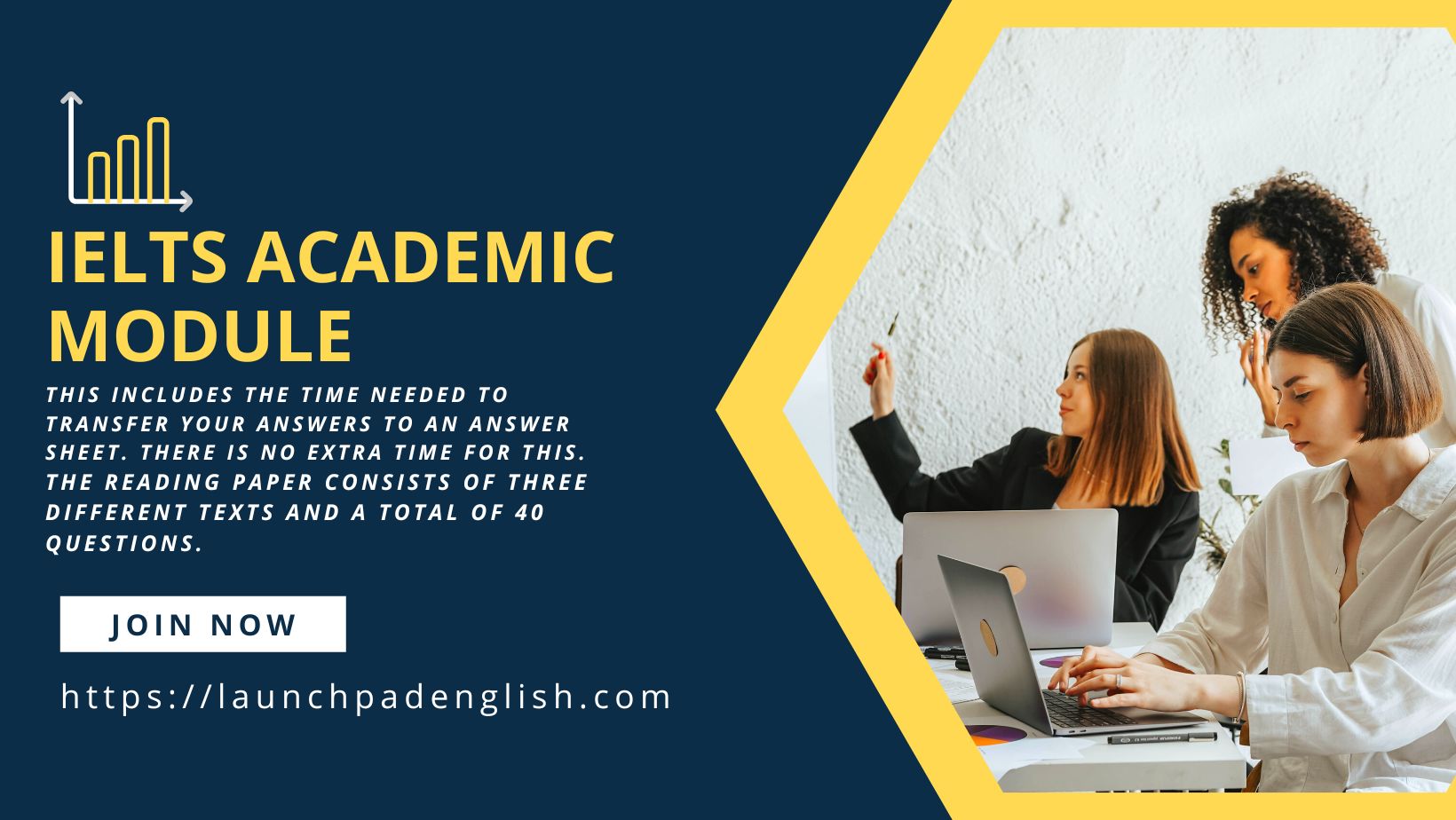IELTS Summary
General Training Module
The General Training Module is commonly used for vocational training programmes (not at degree level) or for immigration purposes. Candidates for the General Training Module take the same Listening and Speaking test as the Academic Module. Only the Reading and Writing papers are different.
- General Training Reading
Time: one hour
N.B. This includes the time needed to transfer your answers to a separate answer sheet. There is no extra time given for this.
This test consists of three different sections and a total of 40 questions.
The texts are about more general topics or related to work. The General
Training Reading paper has three sections, each of increasing difficulty.
The sections are organised as follows.
|
Section |
Reading texts |
| 1 | two or three short texts or several shorter ones (e.g. advertisements) |
| 2 | two texts related to the workplace (e.g. information for staff) |
| 3 | one long discursive text |
The General Training Reading paper has a total of 40 questions.
Section 1 has 14 items. Sections 2 and 3 each have 13.
| Task type | What do I have to do? |
| 1 multiple choice | Choose one answer from alternatives A-D.
Choose two answers from alternatives A-E. Choose two answers from alternatives A-G. |
| 2 identifying information(T/F/NG)
|
Say whether a statement is True/False or Not Given in the text. |
| 3 identifying the writer’s views/claims (Y/N/NG) | Say whether a statement agrees with claims or views in a text (Yes), disagrees with the views/claims in the text (No) or whether there is no information on this in the text (Not Given). |
| 4 matching information | Match the information in the question to the correct paragraph in the text. |
| 5 matching headings | Match a heading from a list of possible answers to the correct paragraph or section of the text. |
| 6 matching features | Match a list of statements to a list of possible answers in a box (e.g. specific people or theories or dates). |
| 7 matching sentence | Complete a sentence by choosing a suitable ending from a box of possible answers. |
| 8 sentence completion | Complete a sentence with a suitable word or words from the text within the word limit given. |
| 9 notes/summary/table/ flow-chart completion
|
Complete notes/a summary/table/flow-chart with a suitable word (or words) from the text within the word limit given. |
| 10 labelling a diagram | Label a diagram with a suitable word (or words) from the text or by choosing from a box of possible answers. |
| 11 short-answer questions | Answer questions using words from the text in the word limit given. |
| 12 multiple matching | Match the information in the question to the correct short text or advertisement. |
Assessment: each question is worth one mark.
- General Training Writing
Time: one hour
This test consists of two separate writing tasks. You must answer both tasks.
| Task | Timing | Length | What do I need to do? |
| Writing Task 1 | 20 minutes | 150 words | Write a letter in response to a given situation |
| WritingTask2 | 40 minutes | 250 words | You need to write a discursive essay. You will be given an opinion, problem or issue that you need to discuss. You may be asked to provide a solution, evaluate a problem, compare and contrast different ideas or opinions, or challenge an argument or idea. |
You will be assessed on the following criteria:
- Task Response
- Coherence and Cohesion
- Lexical Resource
Grammatical Range and Accuracy
N.B. Writing Task 2 is worth twice as many marks as Writing Task I.
- Listening
Time: approximately 30 minutes (plus an additional 10 minutes to transfer your answers)
Academic and General Training candidates take the same Listening test. This consists of four separate sections and a total of 40 questions.
Sections 1 and 2 are set in a social context and Sections 3 and 4 are set in an academic context. In the IELTS Listening, you will hear the text
ONCE ONLY. Bach test is divided up as follows.
| Section | What kind of text will I hear? |
| 1. | A conversation between two people about a general topic with a transactional purpose (e.g. finding out information about travel) |
| 2.
|
A monologue or prompted monoloque on a general topic with a transactional
purpose (e.g. giving information about events in the community). |
| 3. | A conversation between two or three people in an academic context (e.g. a student
and a tutor discussing an academic problem). |
| 4. | A monoloque in an academic context (e.g. a lecture). |
There are ten questions for each section in the listening test. Below are the task types that you may find in any section. You may have between one and three different tasks per section.
| Task type | What do I have to do? |
| notes/summary/table/flow-chart completion | Complete notes/a summary/table/flow-chart with a suitable word or words within the word limit given. |
| multiple choice
|
Choose one answer from alternatives A-C.
Choose two answers from alternatives A-E. |
| short-answer questions | Answer questions in the word limit given. |
| sentence completion
|
Complete a sentence with a suitable word or words within the word limit given. |
| labelling a diagram, plan or map
|
Label a diagram/plan or map with a suitable word (or words)or by choosing from a box of possible answers. |
| Classification
|
Classify the information given in the question according to three different criteria (A, B or C). These may be dates, names, types, etc. |
| Matching | Match a list of statements to a list of possible answers in a box (e.g. people, theories or dates). |
Assessment: each question is worth one mark.
Time: 11-14 minutes
This test consists of an interview with a trained examiner. The interview
is recorded and has three separate parts.
- Speaking
| Part | Timing | What will I need to talk about? |
| 1. | 4-5minutes | Questions on familiar topics (e.g. hobbies, likes and dislikes, etc.). |
| 2.
|
3-4minutes
|
You will be given a booklet with a topic (e.g. describe a good friend)
and some suggestions. You need to talk about the topic for 1-2 minutes. You have about one minute to write notes before you begin. |
| 3. | 4-5minutes
|
The examiner will ask you more detailed and more abstract questions
about the topic in Part 2 (e.g. How important is friendship?). |
You will be assessed on the following criteria:
- Fluency and Coherence
- Lexical Resource
- Grammatical Range and Accuracy
- Pronunciation
IELTS Academic Module

- Academic reading
Time: one hour
N.B. This includes the time needed to transfer your answers to an answer sheet. There is no extra time for this.
The Reading paper consists of three different texts and a total of 40 questions.
The texts are authentic and academic in nature, but written for a non-specialist audience. They are similar to the types of texts you may find in newspapers or magazines. The style may be descriptive or argumentative and at least one text contains detailed logical argument. Texts may contain illustrations. If a text contains technical terms, a simple glossary is provided. The three texts are graded from easiest to most difficult. Each text will have 12-14 items.
Overview of task types
| Task type | What do I have to do? |
| 1 multiple choice | Choose one answer from alternatives A-D.
Choose two answers from alternatives A-E. Choose two answers from alternatives A-G. |
| 2 identifying information(T/F/NG)
|
Say whether a statement is True/False or Not Given in the text. |
| 3 identifying the writer’s views/claims (Y/N/NG) | Say whether a statement agrees with claims or views in a text (Yes), disagrees with the views/claims in the text (No) or whether there is no information on this in the text (Not Given). |
| 4 matching information | Match the information in the question to the correct paragraph in the text. |
| 5 matching headings | Match a heading from a list of possible answers to the correct paragraph or section of the text. |
| 6 matching features | Match a list of statements to a list of possible answers in abox (e.g. specific people or theories or dates). |
| 7 matching sentence | Complete a sentence by choosing a suitable ending from a box of possible answers. |
| 8 sentence completion | Complete a sentence with a suitable word or words from the text within the word limit given. |
| 9 notes/summary/table/flow- chart completion
|
Complete notes/a summary/table/flow-chart with a suitable word (or words) from the text . |
| 10 labelling a diagram | Label a diagram with a suitable word (or words) from the text or by choosing from a box of possible answers. |
| 11 short-answer questions | Answer questions using words from the text. |
The sections are organised as follows.
- Academic Writing
| Task | Timing | Length | What do I need to do? |
| Writing Task 1 | 20 minutes | 150 words | You need to accurately describe and summarise visual information. The information may be presented in a diagram, map, graph or table. |
| WritingTask2 | 40 minutes | 250 words | You need to write a discursive essay. You will be given an opinion, problem or issue that you need to respond to. You may be asked to provide a solution, evaluate a problem, compare and contrast different ideas, or challenge an idea. |
You will be assessed on the following criteria:
- Task Achievement
- Coherence and Cohesion
- Lexical Resource
- Grammatical Range and Accuracy
Writing Task 2 is worth twice as much as Writing Task 1.


Such a very useful information for IELTS aspirants.